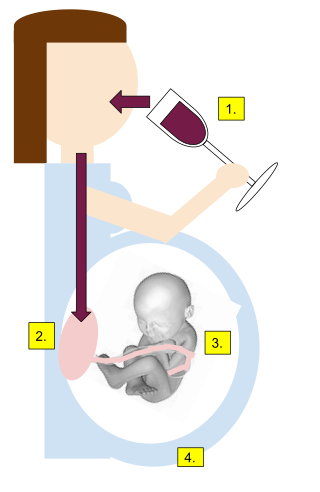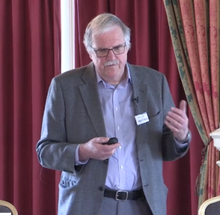
Alcoholics Anonymous (AA) is a global peer-led mutual aid fellowship begun in the U.S. and dedicated to abstinence-based recovery from alcoholism through their spiritually inclined twelve-step program. Besides stressing anonymity and offering membership to anyone wishing to stop drinking, AA's twelve traditions establish it as free to all, non-professional, non-denominational, apolitical and unaffiliated. In 2020 AA estimated its worldwide membership to be over two million with 75% of those in the U.S. and Canada.

Alcoholism is the continued drinking of alcohol despite negative results. Problematic use of alcohol has been mentioned in the earliest historical records, such as in ancient Egypt and in the Bible, and remains widespread; the World Health Organization (WHO) estimated there were 283 million people with alcohol use disorders worldwide as of 2016. The term alcoholism was first coined in 1852, but alcoholism and alcoholic are stigmatizing and discourage seeking treatment, so clinical diagnostic terms such as alcohol use disorder or alcohol dependence are used instead.

Alcohol abuse encompasses a spectrum of unhealthy drinking behaviors, ranging from binge drinking and alcohol dependence to addiction resulting in physical withdrawal symptoms when abruptly stopping the intake of alcohol for more than 24 hours.

Alcohol dependence is a previous psychiatric diagnosis in which an individual is physically or psychologically dependent upon alcohol.
Stanton Peele is a psychologist, attorney, psychotherapist and the author of books and articles on the subject of alcoholism, addiction and addiction treatment.
Gordon Alan Marlatt was a leading American-Canadian clinical psychologist in the field of addictive behaviors from the 1980s through the 2000s. He conducted pioneering research in harm reduction, brief interventions, and relapse prevention.
William Richard Miller is an American clinical psychologist, an emeritus distinguished professor of psychology and psychiatry at the University of New Mexico in Albuquerque. Miller and Stephen Rollnick are the co-founders of motivational interviewing.
Elvin Morton "Bunky" Jellinek, E. Morton Jellinek, or most often, E. M. Jellinek, was a biostatistician, physiologist, and an alcoholism researcher, fluent in nine languages and able to communicate in four others.
The modern disease theory of alcoholism states that problem drinking is sometimes caused by a disease of the brain, characterized by altered brain structure and function.
The Paddington alcohol test (PAT) was first published in the Journal of Accident & Emergency Medicine in 1996. It was designed to identify alcohol-related problems amongst those attending accident and emergency departments. It concords well with the Alcohol Use Disorders Identification Test (AUDIT) questionnaire but is administered in a fifth of the time.

The Natural History of Alcoholism Revisited (1995) is a book by psychiatrist George E. Vaillant that describes two multi-decade studies of the lives of 600 American males, non-alcoholics at the outset, focusing on their lifelong drinking behaviours. By following the men from youth to old age it was possible to chart their drinking patterns and what factors may have contributed to alcoholism. Another study followed 100 severe alcoholics from a clinic eight years after their detoxification. The National Review hailed the first edition (1983) as "a genuine revolution in the field of alcoholism research" and said that "Vaillant has combined clinical experience with an unprecedented amount of empirical data to produce what may ultimately come to be viewed as the single most important contribution to the literature of alcoholism since the first edition of AA's Big Book." Some of the main conclusions of Vaillant's book are:
Moderation Management (MM) is a secular non-profit organization providing peer-run support groups for anyone who would like to reduce their alcohol consumption. MM was founded in 1994 to create an alternative to Alcoholics Anonymous and similar addiction recovery groups for non-dependent problem drinkers who do not necessarily want to stop drinking, but moderate their amount of alcohol consumed to reduce its detrimental consequences.

Alcoholism in family systems refers to the conditions in families that enable alcoholism and the effects of alcoholic behavior by one or more family members on the rest of the family. Mental health professionals are increasingly considering alcoholism and addiction as diseases that flourish in and are enabled by family systems.

Binge drinking, or heavy episodic drinking, is drinking alcoholic beverages with an intention of becoming intoxicated by heavy consumption of alcohol over a short period of time, but definitions vary considerably.
Community reinforcement approach and family training (CRAFT) is a behavior therapy approach in psychotherapy for treating addiction developed by Robert J. Meyers in the late 1970s. Meyers worked with Nathan Azrin in the early 1970s whilst he was developing his own community reinforcement approach (CRA) which uses operant conditioning techniques to help people learn to reduce the power of their addictions and enjoy healthy living. Meyers adapted CRA to create CRAFT, which he described as CRA that "works through family members." CRAFT combines CRA with family training to equip concerned significant others (CSOs) of addicts with supportive techniques to encourage their loved ones to begin and continue treatment and provides them with defences against addiction's damaging effects on themselves.
The Center of Alcohol Studies (CAS) is a multidisciplinary research institute located in the Busch Campus of Rutgers University, which performs clinical and biomedical research on alcohol use and misuse. The center was originally at Yale University and known as the Yale Center of Alcohol Studies, before it moved to Rutgers in 1962. The CAS is also home to the peer-reviewed Journal of Studies on Alcohol and Drugs (JSAD), the oldest journal on alcohol studies; and a library of alcohol literature. Early research in the 1940s at the CAS helped support the disease model of addiction that helped change public perception on alcohol consumption.
Mark B. Sobell, Ph.D., ABPP, a professor at the College of Psychology of Nova Southeastern University in Fort Lauderdale, Florida, is a specialist in addiction. Dr. Mark Sobell is nationally and internationally known for his research in the addiction field. He is a Fellow of the American Psychological Association in Divisions 1, 3, 12, 25, 28, and 50, and is Board Certified in Cognitive and Behavioral Psychology by the American Board of Professional Psychology. He is the co-director of Healthy Lifestyles: Guided Self-Change at Nova Southeastern University.
Linda Carter Sobell, Ph.D., ABPP, is the President's Distinguished Professor at Nova Southeastern University (NSU) in Fort Lauderdale, Florida. She is a professor of clinical psychology, addiction specialist, co-director of NSU's Guided Self-Change clinic, a Motivational Interviewing Trainer, and is board-certified in cognitive and behavioral psychology.
Guided self-change (GSC) treatment has been accepted by American Psychological Association Division 12, Society of Clinical Psychology, as an empirically supported treatment.
Jalie A Tucker is a professor of Health Education and Behavior at the University of Florida. She is known for her research on impulsive and harmful behaviors, such as alcohol and substance use, the effect of the environment on addiction, and natural resolutions to risky behavior including alcohol misuse. She has received numerous awards for excellence in clinical psychology and addiction research, including the 2015 Award for Distinguished Scientific Contributions to Clinical Psychology from the Society of Clinical Psychology. She was honored by APA, Division 50 with the Presidential Award for Service to the Division in 2010 and 2012.







